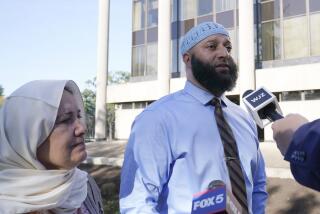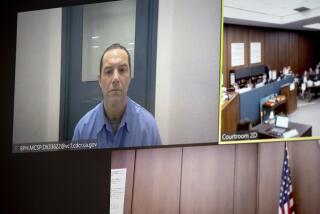Order Banning DNA Data From Trial Is Reversed
- Share via
A federal appeals court on Tuesday ordered a Los Angeles judge to allow jurors in a wrongful conviction case to hear detailed evidence that cleared a man of rape and robbery charges six years ago.
The San Francisco-based U.S. 9th Circuit Court of Appeals unanimously reversed an Aug. 17 decision by U.S. District Judge Percy Anderson, who had barred attorneys for Herman Atkins from presenting results of DNA tests that cleared him of a 1986 rape after he had spent 12 years in prison.
Atkins’ attorneys, Peter Neufeld and Deborah Cornwall, in an emergency motion filed Monday, predicted a “perverse result” if Atkins were not allowed to present the DNA test results and other proof that led to his exoneration six years ago.
The 9th Circuit panel agreed. “Evidence of actual innocence is both relevant and not subject to exclusion” under federal rules of evidence, wrote judges Mary M. Schroeder, Stephen Reinhardt and Kim M. Wardlaw in a brief order issued late Tuesday.
Atkins’ suit for damages is set to begin in federal court in Los Angeles on Aug. 29. Tuesday’s ruling marked the second time the Circuit Court had reversed Anderson. He originally threw out the entire case, but the 9th Circuit reinstated it in September 2005.
Atkins was convicted of raping a store clerk during a robbery at a Lake Elsinore shoe store, but was cleared after post-trial testing showed that his DNA did not match semen on the victim’s sweater.
Riverside County Dist. Atty. Grover Trask filed a court motion in 2000 stating that “scientific analysis of the evidence shows that [Atkins] could not have committed” the rape.
But last week, lawyers for Riverside County persuaded Anderson to prohibit Atkins from presenting jurors with the specific evidence that showed his innocence.
Riverside County’s attorneys said they were willing to stipulate that Atkins was released after a DNA test, but did not want the actual test results or any testimony explaining them to go before the jury. On the other hand, the county’s attorneys plan to call the rape victim to testify that she “is still certain that Atkins is the man who raped her,” according to court papers.
“Mr. Atkins would suffer irreparable harm by going through a wrongful conviction trial that did not include evidence of his actual innocence -- particularly given [Riverside County’s] intention of calling the rape victim to misidentify him again,” Atkins’ lawyers said in a brief to the federal appeals court.
Legal experts said they believed Anderson’s original order marked the first time a judge had barred evidence of innocence at a civil damages trial over a wrongful conviction.
David Rudovsky, who teaches criminal procedure and civil rights law at the University of Pennsylvania Law School, said he found Anderson’s ruling “inexplicable.”
“I don’t think you can let one side present evidence alleging that Atkins is guilty while prohibiting his lawyers from introducing evidence of his innocence from the DNA tests. That is the essence of an unfair trial,” Rudovsky said.
“There is the distinct risk that if the jury believed Atkins to be guilty, there would be significant prejudice to his case.”
Attorneys for Riverside County could not be reached to respond to the late appellate ruling.
More to Read
Sign up for Essential California
The most important California stories and recommendations in your inbox every morning.
You may occasionally receive promotional content from the Los Angeles Times.













